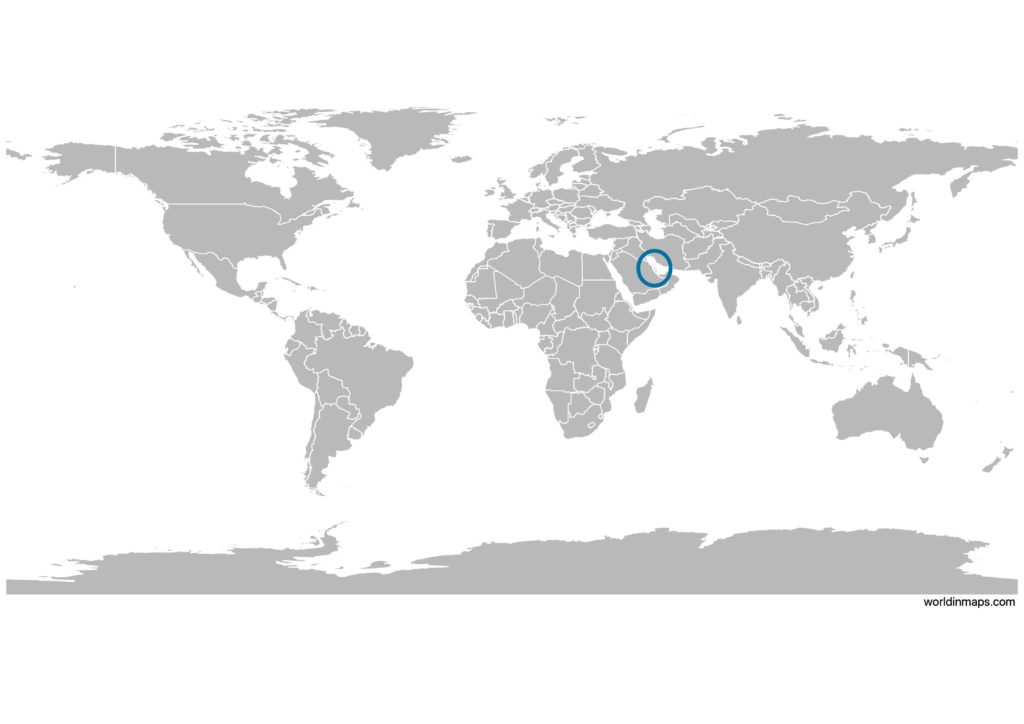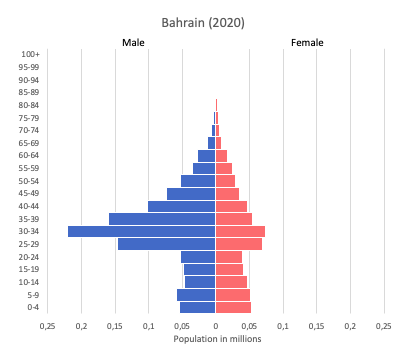Bahrain

| Government | |
| Name | Kingdom of Bahrain |
| Arabic | مملكة البحرين Mamlakat al-Baḥrayn |
| Government type | Constitutional monarchy |
| Capital | Manama (157,474 (2010)) |
| Currency | Bahraini dinar (BHD) |
| People | |
| Population (2020) | 1,701,583 (153rd) |
| Density of population | 1831.1 P/km2 (4th) |
| Nationality | Bahraini |
| Official languages | |
| Arabic | |
| Ethnic groups (2010) | |
| Bahraini | 46% |
| Asian | 45.5% |
| Other Arab | 4.7% |
| African | 1.6% |
| European | 1% |
| Other | 1.2% |
| Religion (2017) | |
| Muslim | 73.7% |
| Christian | 9.3% |
| Jewish | 0.1% |
| Other | 16.7% |
| Life expectancy (2020) | |
| Male | 77.1 years |
| Female | 81.8 years |
| Total population | 79.4 years (52nd) |
| Homicides | |
| Total (2014) | 0.5 per 100,000 people (161st) |
| Geography | |
| Land area | 760 km2 |
| water area | 0 km2 |
| total area | 760 km2 (188th) |
| Lowest point | |
| Persian Gulf | 0 m |
| Highest point | |
| Jabal ad Dukhan | 135 m |
| Land use (2016) | |
| Agricultural land | 11.3% |
| Arable land | 2.1% |
| Permanent crops | 3.9% |
| Permanent pasture | 5.3% |
| Forest | 0.7% |
| Other | 88% |
| Urbanization | |
| Urban population (2020) | 89.5% |
| Rate of urbanization | 4.38% annual rate of change (2015 – 2020) |
| Economy | |
| Labor force (2017) – excludes unemployed ; 44% of the population in the 15-64 age group is non-national | 831,600 (149th) |
| Agriculture | 1% |
| Industry | 32% |
| Services | 67% |
| Unemployment rate (2017) – official estimate; actual rate is higher | 3.6% (43rd) |
| GDP (PPP) (estimate 2019) | |
| Total | $78.760 billion (94th) |
| Per capita | $52,129 (19th) |
| GDP (nominal) (estimate 2019) | |
| Total | $41.607 billion (91st) |
| Per capita | $27,538 (33rd) |
| GDP by sector (estimate 2017) | |
| Agriculture | 0.3% |
| Industry | 39.3% |
| Services | 60.4% |
| Exports (2017) | $15.38 billion (75th) |
| Exports partners (2017) | |
| UAE | 19.6% |
| Saudi Arabia | 11.7% |
| US | 10.8% |
| Oman | 8.1% |
| China | 6.5% |
| Qatar | 5.7% |
| Japan | 4.2% |
| Imports (2017) | $16.08 billion (84th) |
| Imports partners (2017) | |
| China | 8.8% |
| UAE | 7.2% |
| US | 7.1% |
| Australia | 5.3% |
| Japan | 4.8% |
Bahrain on the world map

Bahrain is located in Asia and more specifically in the Middle East.
Demography
Population pyramid

The anomaly of the pyramid is linked to a big amount of non-national workers.
Age structure data
Estimate for 2020:
- 0-14 years: 18.45% (male 141,039/female 136,687)
- 15-24 years: 15.16% (male 129,310/female 98,817)
- 25-54 years: 56.14% (male 550,135/female 294,778)
- 55-64 years: 6.89% (male 64,761/female 38,870)
- 65 years and over: 3.36% (male 25,799/female 24,807)
Remark: the age structure of a population affects a nation’s key socioeconomic issues. Countries with young populations (high percentage under age 15) need to invest more in schools, while countries with older populations (high percentage ages 65 and over) need to invest more in the health sector. The age structure can also be used to help predict potential political issues. For example, the rapid growth of a young adult population unable to find employment can lead to unrest.
Population from 1950 to 2020
Source: United Nations, Department of Economic and Social Affairs, Population Division (2019). World Population Prospects 2019, Online Edition. Rev. 1.
Evolution of the life expectancy from 1960 to 2018
Source: World Development Indicators, The World Bank
Economy
Agriculture:
fruit, vegetables, poultry, dairy products, shrimp, fish
Industries:
petroleum processing and refining, aluminum smelting, iron pelletization, fertilizers, Islamic and offshore banking, insurance, ship repairing, tourism
Exports – commodities:
petroleum and petroleum products, aluminum, textiles
Imports – commodities:
crude oil, machinery, chemicals
Time zone and current time in Bahrain
Go to our interactive map to get the current time in Bahrain